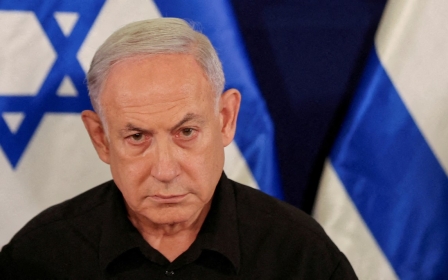War on Gaza: Why Hamas might have already won

On 7 October, Hamas mounted a bold and desperate operation in which it invaded southern Israel and occupied a score of towns and kibbutzim, killing 1,140 people.
This carefully coordinated air, land and sea assault by Hamas, which is proscribed as a terrorist organisation in the UK and other countries, was overwhelming in scope. It stunned Israel and the world.
After well over a year of planning and training, 1,000 fighters broke through the billion-dollar defensive shield Israel had painstakingly erected around Gaza over a decade or more.
The assault showed everyone that all the sophisticated technology in the world can be defeated by a small guerilla force using surveillance, planning and swarming battlefield tactics.
Hamas breached security measures that Israelis had been lulled into thinking were impenetrable. It smashed all assumptions Israeli military intelligence had made about Hamas.
Stay informed with MEE's newsletters
Sign up to get the latest alerts, insights and analysis, starting with Turkey Unpacked
The Shin Bet and Israeli army smugly believed that Hamas had too much to lose to mount a major operation against Israel; that it was more interested in maintaining its rule of Gaza than in going to war. They were utterly wrong.
Rebellion against fate
Israel and its 17-year siege of Gaza have reduced its residents to despair. Most see no horizon for hope for a better life, for a better future. They live, but at the sufferance of others.
The attacks were a rebellion against fate - a declaration that the Palestinian people, regardless of the enormous costs, will fight their oppressors.
Follow Middle East Eye's live coverage for the latest on the Israel-Palestine war
The world, too, had seemingly lost interest in Palestine. The US had engineered the Abraham Accords with four Arab states that had previously declared their allegiance to the Palestinian cause.
Until the 7 October attack, the Biden administration had been courting Saudi Arabia to join the quartet. It likely would have. But Hamas has dashed one of US President Joe Biden’s few regional achievements.
Palestinians have once again taken centre stage. They have forced the world to confront their plight. They have demanded their rights.
The 7 October attack has reminded everyone that Palestinians are steadfast and will not go quietly; and that it ignores them at a dreadful cost.
Israel’s bloody invasion, costing more than 22,000 Palestine lives (and more each day), has devastated global perceptions of Israel.
Instead of being seen as a democracy and technological innovator, the world now sees Israel as a bloodthirsty, genocidal regime.
Hamas has once again upstaged the Palestinian Authority as a standard-bearer of Palestinian nationalism. Fatah is now little more than a corrupt collaborator with the Israeli enemy.
Hamas has struck a blow, reminding Palestinians that armed resistance, no matter the cost, is all the world understands.
Wars on two fronts
Hamas has strengthened the hand of Iran and its axis of resistance, which has mounted attacks against US and Israeli military and commercial interests, from Iraq to Yemen.
Israel now faces wars on two fronts: in Gaza and in the north against Hezbollah. If anything, the latter is an even more formidable enemy than Hamas. There have been skirmishes and Israeli attacks against not only Hezbollah, but Lebanese army positions, the latter sparking US criticism.
The Israeli army has deliberately attacked journalists who were reporting on the conflict, killing more than 100 - part of a systematic effort to eliminate journalists who document Israeli crimes.
If you don't want to be dragged down by an ally pursuing interests you don't share, you must make it aware of the limits to the relationship. Biden has refused
The Iranian-allied Houthis in Yemen have mounted a series of missile attacks against Israel-bound shipping in the Red Sea maritime lanes.
US warships have attacked Houthi boats and shot down missiles in Yemen and faced attacks in Syria and Iraq.
Though the US doesn’t want to be drawn into a protracted regional conflict, its lock-step support for Israel has inevitably sucked it into what it seeks to avoid.
If you don’t want to be dragged down by an ally pursuing interests you don’t share, you must make it aware of the limits to the relationship. Biden has refused, at political cost.
Supporting Israeli genocide offers the very real prospect that he could be voted out of the White House in 2024, and replaced by a president who will not only defend Israel, but encourage its most dangerous military adventurism.
Steep cost
The attack on Israel served notice that neither Hamas, nor Palestinians in general, believe in the chimera of the two-state solution. As long as the world continues to prop up this corpse as if it would somehow come back to life by a magical spell, Hamas will expose it for the lie it is.
Every Palestinian knows there is no hope of a Palestinian state. Israel vehemently opposes it. Even the so-called moderate Israeli parties refuse to address it, let alone endorse it. Even speaking about Palestinians in a marginally respectful way marks any political figure for ridicule and political oblivion.
Nor do Palestinians expect much from the US or European states. They know that none are willing to expend the political capital necessary to overcome Israeli resistance.
By all standard measurements of armed conflict, Israel is winning its war against Gaza. It has killed an estimated 8,000 Hamas fighters (out of 30,000).
But over nearly three months, it has eliminated less than 25 percent of Hamas's military forces. The Israeli army has destroyed miles of Hamas tunnels, but it hasn’t come close to eliminating the 300 miles of such underground redoubts, and it refuses to send its soldiers into them because the costs would be high.
It has laid siege, both to punish Palestinians in Gaza and to pressure Hamas: to make life difficult, if not impossible. It has virtual mastery of the land, sea and air surrounding the enclave. It operates everywhere relatively freely.
All this at a steep cost: 500 Israeli soldiers killed and more than 5,000 injured, with many suffering amputations and other serious disabilities.
Israel losing the war
Yet, it is still losing the war. It may be counter-intuitive to say this, but there is no way Israel can win the war it commenced. All Hamas has to do to win is survive.
Israeli Prime Minister Benjamin Netanyahu has said repeatedly that his country’s goal is to eliminate Hamas. Biden has added his own support for this goal.
Israeli leaders understand there is only one way to do this: they must eliminate or expel the entire population of Gaza. Not only has the intelligence ministry released a plan to do so by expelling Palestinians to the Sinai desert, but US Secretary of State Antony Blinken has also travelled to the Middle East to pitch the Israeli-concocted plan to Egypt and Jordan.
They, in turn, roundly rejected it. Two Israeli MKs published a plan in the Wall Street Journal for expelling all Palestinians in Gaza to Arab and Muslim countries in the region. That hasn’t been received any better.
Israel will not eliminate Palestinians from Gaza any more than it will eliminate Hamas. All the talk by Netanyahu and Biden is bluster - promises made which cannot be kept.
This is part of the tragedy of this conflict. No one speaks clearly and truthfully. Everyone has delusions that somehow Hamas will acquiesce because it must.
But Hamas never cooperates. It continues to resist. Nothing can stop this no matter how many lies are told. The more lies, the less the world trusts anything the Biden administration or Israelis say.
Even if Israel succeeded in ethnically cleansing Gaza, it would not end the conflict. Hamas is not just a political or military entity. It is a movement purporting to promote the rights and interests of the Palestinian people.
You cannot kill such a movement. You can fight it. You can kill its fighters. You can occupy and even try to ethnically cleanse all its supporters.
But the movement can still survive. That means Israeli failure and the erosion of its military deterrent as it faces regional rivals.
This will embolden its enemies to intensify armed resistance throughout the Middle East, inside Gaza or out. You may defeat a movement on the battlefield, but you cannot eliminate it.
Outrage
Israel has paid dearly for this “victory”, losing an average of 10 soldiers every week. Last month, 10 were killed in a single battle after being ambushed by Hamas fighters.
The Israeli army has killed hostages in its battles against Hamas, in one case mistakenly gunning down three who had escaped from their captors.
The united front put up by Israelis since 7 October is beginning to crumble
The resulting furore among hostage families has fuelled outrage across Israel. Thousands have protested outside the army’s Kirya headquarters in Tel Aviv. The brother of one of the murdered hostages accused the Israeli army of executing him.
The united front put up by Israelis since 7 October is beginning to crumble. Netanyahu, his rule already on tenterhooks before Hamas's attack, is in an even more precarious position now.
In fact, he may prefer to try and prolong the war so as to avoid the wrath of the Israeli electorate, most of whom want him gone.
The views expressed in this article belong to the author and do not necessarily reflect the editorial policy of Middle East Eye.
Middle East Eye delivers independent and unrivalled coverage and analysis of the Middle East, North Africa and beyond. To learn more about republishing this content and the associated fees, please fill out this form. More about MEE can be found here.








